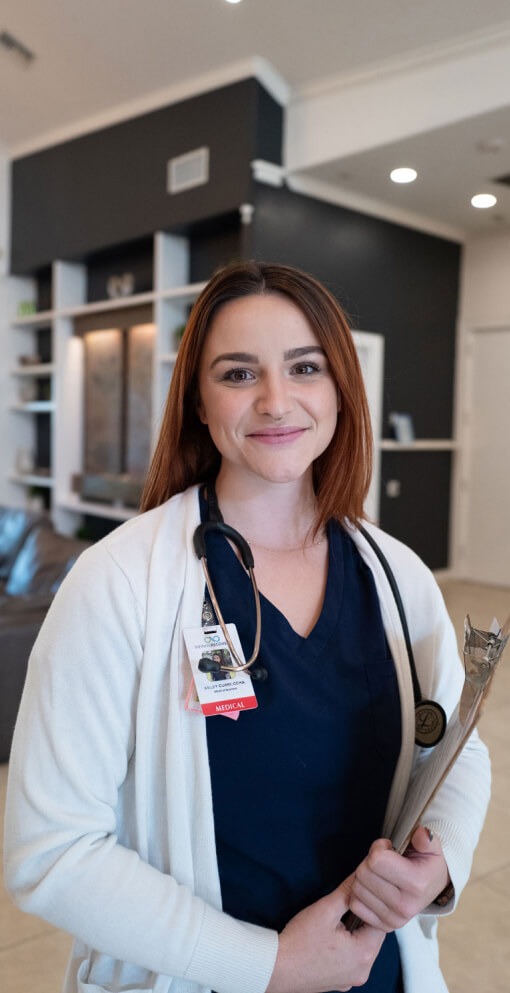Therapy for Substance
Abuse Disorder
Infinite Recovery offers individual therapy in Austin for clients in our inpatient and outpatient treatment programs. We partner with experienced therapists who are skilled in treating substance use disorders and co-occurring mental health disorders.
Clients work with the same therapist through each level of care and are encouraged to continue their sessions following discharge. We can also match clients with Austin counseling services that accept their insurance.


Specialized Treatment Teams
Each client enrolled in our outpatient and inpatient treatment programs is assigned a therapist, a case manager and a recovery specialist. This treatment team works hand-in-hand with the client, and their family when appropriate, to develop a personalized treatment plan that meets their unique goals and situation. This treatment plan identifies the client’s particular stressors and triggers, outlines treatment methods to be used and incorporates measurement tools to help assess progress.
If a client stays within the Infinite Recovery program throughout levels of care, they will maintain the same treatment team, which keeps their experience consistent and helps create a stable foundation of support.

Our Therapeutic Approaches

Infinite Recovery’s substance abuse treatment programs are evidence-based, trauma-informed, and grounded in the philosophy of the 12 Steps of Recovery. Although the 12 Steps are the foundation of our therapeutic approach, our clinicians incorporate a number of modalities and tools as they support clients in navigating the path to recovery. These modalities include:
Accelerated Resolution Therapy, also called ART or ARTherapy, is a type of psychotherapy that is utilized to treat anxiety, phobias, post-traumatic stress disorder, substance use disorders and more in a clinical setting. It has been proven to help reduce strong physical and emotional reactions to distressing memories and achieve therapeutic benefits in as little as a few sessions. [1]
Cognitive behavioral therapy is a common form of psychotherapy or “talk therapy” and helps treat anxiety, depression, substance use disorders, relationship issues and mental health disorders. In general, CBT deals with the present moment and current thought patterns of the client, instead of evaluating a client’s past.
Dialectical behavior therapy (DBT) differs from CBT in that it attempts to balance acceptance of oneself and one’s situation with the desire to change and become healthier. While DBT does support creating new goals and working toward change, it also emphasizes self-compassion and self-acceptance, helping clients feel validated and understood as they navigate their emotional landscape. [3]
Motivational interviewing is a style of communication that emphasizes “language of change” and helps strengthen a person’s motivation to meet a specific goal within an environment of compassion and acceptance. It is designed to help empower people to make meaningful change by balancing listening with giving advice and information. [4]
This type of psychotherapy is based on the framework that the family unit is inherently interconnected and that to thoroughly heal from addiction, mental health or other issues, a person must examine the role their family has to play in their thoughts and behaviors. Family systems theory posits that what affects one member of the family affects all. [5]
Individualized Care
There are many approaches to therapy and the therapeutic process. The clinicians we work with at Infinite Recovery draw on evidence-based practices to formulate personalized treatment plans for each client. This means that they provide support at the level most appropriate to the client’s situation and in a form that best fits their personality, preferences and needs. Because the process is so individualized, therapy will look different for every client in our program. Some individuals respond better to talk therapy, while others benefit from a more somatic (or body-first) approach. By working with our mental health professionals, a person in recovery can determine what forms of therapy are most useful to them and their specific journey.
How is Individual Therapy Useful for Addiction Recovery and Mental Health?
Therapy and clinical mental health counseling give individuals the chance to work one-on-one with a licensed professional counselor who can help them navigate past traumas, process their emotions, understand mental health symptoms, and uncover the root causes of their addictive behavior. Substance abuse and addiction are often connected to mental health conditions such as anxiety, depression, low self-esteem, and a trained therapist can help a client understand how these conditions connect to one another and connect to their addiction.
Benefits of therapy include:
- Improving self-awareness and self-esteem
- Boosting mood and sense of well-being
- Relieving symptoms of anxiety, depression and other mental health disorders
- Formulating healthy strategies for stress management and responding to life transitions
- Reducing certain health issues, morbidity and mortality
- Improving work functioning
- Decreasing the risk of psychiatric hospitalization
- Treating certain cognitive disabilities and impairments [6]
By working with a trained and experienced mental health professional, a person can gain invaluable insight into their thoughts, feelings and behaviors. They will be able to process their experiences in a safe, supportive, and non-judgmental environment where their perspective is validated and understood. This can not only be tremendously healing in the moment, but can give individuals the tools they need to continue this valuable work outside of the counseling sessions.
What to Expect During a Therapy Session
We connect clients with Austin therapists and counselors who have experience with addiction recovery and specialize in particular areas, such as relationship problems, trauma counseling, family conflict, marriage counseling and more. While sessions look slightly different depending on the client and type of therapy approach, most will follow a similar structure.
First, new clients meet with a therapist or licensed clinical social worker to discuss why they are seeking therapy and what their personal growth goals are during treatment. The therapist will ask questions about the client’s background, family, relationships, history with substance abuse, emotional state, and physical or psychological symptoms. From there, the therapist will utilize the psychotherapy approach (or approaches) that seem like the best fit to facilitate the client’s healing and growth.
Some of the goals of therapy can include:
- Reducing symptoms of anxiety, depression, or mental illness
- Processing past traumatic experiences
- Increasing emotional awareness
- Improving relationships
- The opportunity to practice new communication skills and feel heard
Other Therapies We Offer
In addition to individual counseling, we offer a number of other therapy services through our Austin area addiction treatment program. These include online therapy, group therapy, family therapy, trauma therapy, and psychiatric care. To learn more about our counseling options in Austin, TX, reach out today.
Our therapies include:
- ART Therapy (Accelerated Resolution Therapy)
- Boxing and Body Movement Therapy
- Cognitive Behavioral Therapy
- Family Therapy
- Family Dynamics Therapy
- Group Therapy
- Individual Therapy
- Motivational Interviewing
- Relapse Prevention Therapy
- Spirituality Therapy

[1] https://acceleratedresolutiontherapy.com/
[2] https://www.ncbi.nlm.nih.gov/books/NBK279297/
[3] https://www.ncbi.nlm.nih.gov/pmc/articles/PMC2963469/
[4] https://motivationalinterviewing.org/understanding-motivational-interviewing
[5] https://www.thebowencenter.org/introduction-eight-concepts
[6] https://www.apa.org/about/policy/resolution-psychotherapy
Find a Therapist in Austin to Support Your Recovery
If you are seeking a therapist in the Austin area to support you in your journey to sobriety, reach out to Infinite Recovery today. Mental health is a focus of our inpatient and outpatient programs, as is understanding and addressing the root causes of addictive behavior so that individuals can lead healthy, fulfilling sober lives.
Every client in our Austin recovery programs is paired with a professional counselor or licensed clinical social worker who supports them in processing the thoughts and feelings that arise during the addiction recovery process. Our therapeutic approach is evidence-based, trauma-informed, and also draws on the 12 Steps to Recovery as outlined by Alcoholics Anonymous.
We offer a full range of care, from detox to inpatient to outpatient services, in the Austin, Texas area, and all of our programs accept nearly every major health insurance carrier as an in-network provider. Contact us today to learn more!